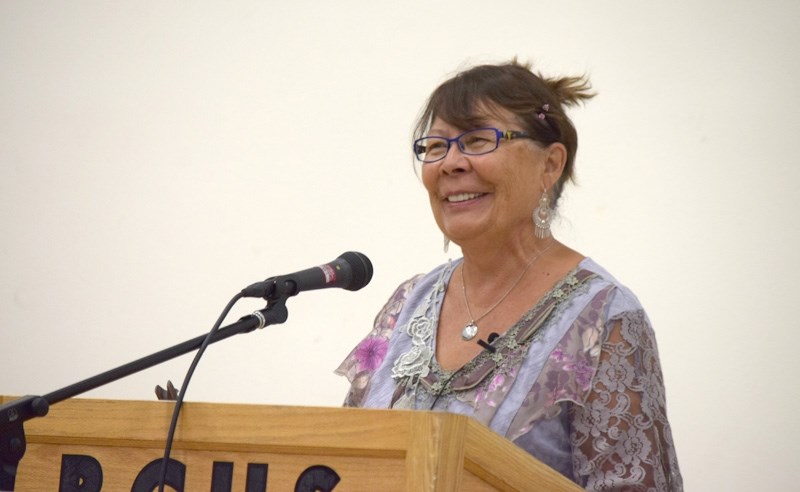When it comes to understanding the challenges of First Nations, Metis and Inuit (FNMI) there is still a lot of work to be done, but the good news is the situation is improving.
That is the message Bee Calliou Schadeck had for the attendees of Pembina Hills Public Schools (PHPS) staff on Tuesday, Aug. 30, at Barrhead Composite High School during their first professional day of the year.
Calliou Schadeck is a member of the Michel First Nation and as a youngster growing up on a farm in Lac Ste. Anne near Lake Wabamun, she was often the only ‘Indian’ in her school.
“In those days you didn’t want to be Indian. At least I sure didn’t want to be,” she said, adding that is why she was so scared when in Grade 5 her teacher asked the class to fill out a form indicating what their ‘racial background’ was.
Calliou Schadeck wrote French. Her two younger sisters said Scottish and Irish.
“That is because everything I heard was negative — drunken Indian, lazy Indian, stupid Indian,” she said.
And it wasn’t just in the media or in public where she heard these derogatory comments regarding her heritage. It was in the schoolyard as well.
Although Calliou Schadeck did her best to conceal her ethnicity to her schoolmates, it inevitably came out and the teasing and verbal put-downs began.
She recalled one especially hurtful incident on the schoolyard.
In grade school one of Calliou Schadeck’s strengths was her athletic ability. Because of this ability she was often chosen first among the girls for sports teams.
“So I figured, the way it should work is that as the top female athlete, my boyfriend should be the best at sports too,” she said, adding the boy who was best at sports happened to be a blue-eyed blond.
One day, one of this boy’s friends mentioned that Calliou Schadeck had a crush on him.
The boy responded, saying ‘Who? That squaw?’ in a loud, disgusted voice.
Calliou Schadeck was devastated.
“I remember crying and being so angry,” she said. “Why was I born and why do I have to look like this?”
This was just one of the many stories Calliou Schadeck told the audience, with most of them being much more graphic in nature of accounts of friends and relatives’ experiences in residential schools.
One of the more emotional stories Calliou Schadeck told the audience was one she recently found out about when she accompanied her friend on a trip back to her old residential school in 2000.
Her friend told her how excited she was when she was told she and her siblings were going to go to school.
However, that excitement soon turned to sadness shortly after boarding the bus that would take them to the residential school where they would spend the next 11.5 years.
“They decided to go to the back of the bus and wave out the window and there they saw their mother kneeling in the dirt, pounding the ground crying,” she said.
At bedtime her little sister would cry to herself because she missed her mother so much. Unfortunately, the consequences of this were often a beating at the hands of the nuns.
In order to stop her from crying, her friend told her sister that if she didn’t cry she would lift her to the windowsill so she could see the lights of home.
Her friend also told her about how during the night the nuns would patrol the dormitory with flashlights to ensure that all the children’s hands were outside the covers.
“If they were under the covers, the light would go on, the covers pulled back and they would get the strap,” Calliou Schadeck said, adding it was during the night that the nuns would select a girl to bring to the priests.
“She told me, I knew what they did because it happened to me many times, that it was for the priests’ sexual pleasure.”
The school’s dining room also held vivid memories for Calliou Schadeck’s friend. She recounted stories of how their place at the table was reserved by number and not her name. She was 78. She told how the children were forced to eat whatever was put before them, no matter how distasteful. On one occasion a girl beside her friend, couldn’t hold down her meal and regurgitated it.
“They forced her to eat her own vomit,” she said.
Her friend and her siblings left the school when they were 16, but their experiences impacted not only them, but also their children, because as her friend told her, they passed on what they learned at the school to their children.
“We didn’t know how to be parents. We learned how to hit and how to be mean,” her friend told Calliou Schadeck.
Both of Calliou Schadeck’s friend’s siblings ended having alcohol issues. Her brother’s son was murdered in a drug deal.
“My friend had three kids. One became a crack addict living on the streets, one an alcohozlic, while the other chose prescription drugs,” Calliou Schadeck said.
While Calliou Schadeck is proud of to be a First Nations woman, this is the type of emotional scars that spans multiple generations and students are still bringing this baggage with them into the classroom today.
However, she said there is light at the end of the tunnel.
“Things are changing because of people like you, who are interested in learning this stuff,” she said, adding Alberta, which had the most residential schools is taking the lead through things like the Truth and Reconciliation Commission and at smaller events where aboriginal people can share their stories.



